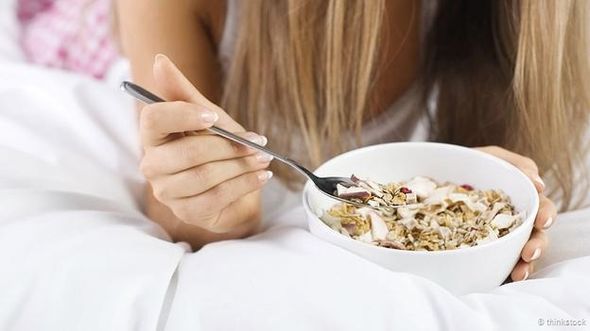怎样才能睡个好觉 - BBC大卫·罗布森(David Robson)(2023年7月9日)

很少有什么体验能像辗转反侧、难以入睡的夜晚那么令人难受。从理论上讲,睡觉应该是世界上最自然、最不费力的事情,但失眠现象却非常普遍。
更令人沮丧的是,越来越多的证据显示,你花在睡觉上的时间对你的身心健康的影响,与你在走路、谈话和吃饭上花费的时间同等重要。睡个好觉可以调节情绪、增强注意力、提升记忆力,而心脏病和糖尿病等各种疾病也与睡眠不足存在联系。
单纯用意志力让自己入睡可能会适得其反,我们应该借助各种措施让自己更容易进入梦乡。但究竟哪些有用,哪些没用?BBC Future评估了各种证据来找出答案。
不要天黑后喝咖啡

(图片来源:Thinkstock)
别喝咖啡绝对是大家异口同声的建议,这的确值得反复强调。事实上,这个规矩可能不像你想象的那么严格。如果你下午早一点喝咖啡,多数咖啡因在晚上11点前就会从你的体内排出。
所以尽管睡前6个小时内不喝咖啡更容易入睡,但目前还不清楚在这个时间段之外戒掉咖啡是否有什么好处。值得一提的是,咖啡因对每个人的影响不尽相同,有些人存在基因变异,因而对咖啡因不太敏感——所以只有亲身尝试才能知道哪种方法对你有效。
要坚持写睡眠日记

(图片来源:Thinkstock)
戒酒、定期锻炼、白天别睡觉、遵守严格的作息时间可以改善“睡眠卫生”,为深度睡眠做好准备。
当然,在睡觉前的几个小时内不要从事任何紧张的活动——这种习惯说起来容易,要记住可并非易事。正因如此,一些研究建议将睡觉前的活动记录成一份“睡眠日记”,这有助于避开最糟糕的失眠诱因。
不要打开你最喜欢的阅读设备

(图片来源:Thinkstock)
尽管阅读可能有催眠作用,但由于阅读文字的方式发生了变化,可能导致你的身体韵律紊乱。很多电子阅读器的背光都是蓝光,这会导致大脑把晚上误当成白天。
或许正因如此,最近有研究显示,睡前几小时阅读这些设备似乎会抑制褪黑素(睡眠激素),因此与传统的纸面文字相比,反而会加大入睡难度。平板电脑、MP3播放器和智能手机同样如此。
所以,如果希望第二天精神百倍,那就最好不要在床上使用数字设备。
要尝试一些“助眠食物”

(图片来源:Thinkstock)
有一种民间说法是,睡前吃奶酪和巧克力会做噩梦。这仍然有待科学验证,但白天摄入的食物显然会对你的入睡速度和睡眠质量产生影响。
高碳水化合物、高蛋白(尤其是富含油脂的鱼类),但低脂肪的食物可能给整体的睡眠时间和睡眠质量带来一定的好处,前提是要在睡觉前至少一小时摄入。富含色氨酸(这是多种神经递质的重要前体)和褪黑素的食物或许也有助于调节生物钟,让大脑为更深度的睡眠做好准备。
最近的评估表明,300克火鸡、200克南瓜籽或一杯酸樱桃汁便可为你带来足够剂量的这些混合物——但目前还缺乏确凿的证据。
要采用新的睡姿(或学习迪吉里杜管)

(图片来源Thinkstock)
很多焦躁不安的夜晚都与睡眠呼吸暂停有关——这种状况与打鼾关系密切,在这种情况下,气道会在你没有意识的情况下收缩。通常情况下,睡眠者甚至不知道是什么把他们叫醒的——尽管这种情况每晚都会发生许多次。
打鼾的原因有很多,但有些情况下,可能只需要从仰卧位变成俯卧位或侧卧位即可解决。还有一种比较怪诞的建议,那就是学习迪吉里杜管,可能是因为这么做可以强化呼吸系统的肌肉强度。
《英国医学期刊》(British Medical Journal)的一项研究发现,学习乐器可以让一些睡眠呼吸暂停患者获得更加安稳的睡眠,减少被打断的次数。这显然不适合所有人——尤其是当你的邻居们也希望好好睡觉时。
你可能已经发现,没有能够绝对避免失眠的方法。但如果能充分考虑各种可能导致你辗转反侧、难以入睡的因素,你至少可以开始尝试改变习惯,看看哪些方法适合自己。这肯定比数羊有效。
(责编:路西)
Dos and don’ts for restful sleep - By David Robson
Few experiences are as maddening as a restless night. Sleep should, in theory, be the most natural and effortless activity in the world, yet insomnia is common to many of us. To add to the frustration, it is now becoming clear that the hours you spend in bed are just as important to your physical and mental health as those spent walking, talking and eating. A good night’s rest can help regulate your mood, sharpen your attention, and boost your memory, while ailments from heart disease to diabetes have been linked to those struggling to get sufficient sleep.
Simply willing yourself to fall to sleep can make its sweet relief even more elusive, and we resort to all sorts of measures to help ease our journey to the land of nod. But what works, and what doesn’t? BBC Future has reviewed the evidence to find out.
Avoiding caffeine is obvious advice, but it's worth repeating. The good news is that you may not need to be as strict as once thought. If you have your last coffee in the early afternoon, most of the caffeine will have been flushed out of your body by 11pm. So although avoiding coffee or tea within 6 hours of going to bed will make it much easier to drop off, it is unclear whether there are any benefits to abstaining outside that time period. It’s also worth noting that not everyone is affected by caffeine equally; some people have a gene variant which means they are much less sensitive to caffeine’s effects – so it’s worth experimenting with what works for you.
Cutting down on alcohol, taking regular exercise, avoiding daytime naps and following a rigid bedtime schedule can also improve your “sleep hygiene” and set you up for deeper slumbers. And it should go without saying that you should avoid doing anything strenuous or stressful within a few hours of sleep time – a habit that is easier said than remembered. For this reason, some studies suggest keeping a sleep diary of your activity before bed, which helps to ensure you avoid the worst triggers.
Although the act of reading may be soporific, changes in the way we consume literature could be sending your bodily rhythms into disarray. Many e-readers are backlit with blue frequencies of light – which can fool the brain into thinking that it’s still daytime. Perhaps for this reason, a recent study found that reading on these devices for a few hours before bed seems to suppress melatonin (the sleep hormone) and therefore makes it harder to doze off, compared to a traditional paperback. The same goes for tablets, MP3 players and smartphones. So if you want to feel refreshed the next day, the bedroom may be the perfect place for an analogue revival.
According to the old wives’ tale, cheese and chocolate before bed will give you nightmares. That remains to be proven scientifically, but your day’s meals can certainly influence how quickly you get to sleep, and the quality of your slumbers. Meals high in carbohydrates and protein (especially oily fish), but low in fat, show moderate benefits to overall sleep duration and quality, provided they are eaten at least an hour before you plan to drop off. Food rich in tryptophan (an important precursor to several neurotransmitters), and the hormone melatonin, might also help regulate the body clock to prepare your brain for a more restful night. A recent review, charting the evidence so far, suggests that about 300g of turkey, 200g of pumpkin seeds, or a glass of tart cherry juice, could give you the necessary dose of these compounds – though hard evidence is lacking.
Many restless nights can be linked to sleep apnoea – a condition linked to snoring, in which the airways becomes constricted when you are unconscious. Often, the sleeper doesn’t even realise what has woken them up with a start – despite the fact that it can happen many times in one night. There are several causes, but some cases may be easily solved by switching from lying on your back, to sleeping on your front or side. Another, more left-field suggestion is to learn the didgeridoo; perhaps because it strengthens muscles in the respiratory system. A small study in the British Medical Journal found that learning the instrument gave some sufferers a smoother sleep with fewer interruptions. Certainly not a solution for everyone – particularly those with close neighbours trying to get some sleep themselves.
As you may have gathered, there is no fool-proof path to a sleepless night. But by considering the different cocktail of factors that may make you toss and turn in bed, you can at least start to experiment with your habits to see what works for you. It certainly beats counting sheep.